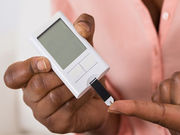Findings for clinically complex patients with type 2 diabetes
MONDAY, June 6, 2016 (HealthDay News) — Intensive diabetes mellitus treatment nearly doubles the risk of severe hypoglycemia requiring medical attention in clinically complex patients, according to a study published online June 6 in JAMA Internal Medicine.
Rozalina McCoy, M.D., an endocrinologist at the Mayo Clinic in Rochester, Minn., and colleagues reviewed information for 31,542 adults (median age, 58 years). All had stable and controlled type 2 diabetes without insulin treatment, and none had a prior history of severe hypoglycemia. Intensive treatment was defined as use of more glucose-lowering medications than recommended by practice guidelines per glycated hemoglobin level.
The researchers found that the risk-adjusted probability of intensive treatment was 25.7 percent in patients with low clinical complexity and 20.8 percent in patients with high clinical complexity. In patients with low clinical complexity, the risk-adjusted probability of severe hypoglycemia during the subsequent two years was 1.02 and 1.30 percent with standard and intensive treatment, respectively. In patients with high clinical complexity, the risk-adjusted probability of severe hypoglycemia increased from 1.74 percent to 3.04 percent with standard and intensive treatment, respectively.
“This means that three out of 100 older or clinically complex patients with diabetes who never had hypoglycemia before, whose glycated hemoglobin is within recommended targets, and who are not on insulin, will experience a severe hypoglycemic episode at some point over two years,” McCoy said in a Mayo news release.
Copyright © 2016 HealthDay. All rights reserved.








